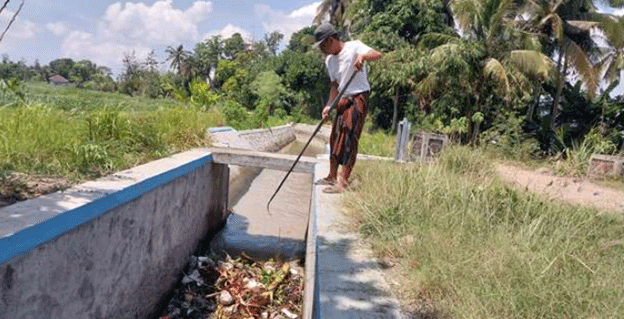Corn farmers in Dusun Aik Paek Laul, Desa Labulia, Lombok Tengah, are grappling with a potential agricultural crisis as nearly 30 hectares of corn fields, planted with seeds provided through government assistance, are at risk of crop failure. The lack of proper irrigation due to blockages caused by accumulated waste has severely restricted water supply to the fields, putting the livelihoods of many farmers in jeopardy.
One affected farmer, H. Misbah, who cultivates 3 hectares of corn, expressed deep concern. “It’s been over a month and a half, and we’ve only received water once. If the water doesn’t flow soon, we’ll lose the crop,” Misbah explained to the media on September 19, 2024. While the farmers benefited from free seeds, Misbah emphasized that he and others had made significant financial investments, especially in fertilizers, to ensure a good yield. He noted that for one round of fertilization, around 5 quintals per hectare are required. Given the shortfall of subsidized fertilizers, farmers like Misbah had to purchase non-subsidized fertilizer at significantly higher prices, paying up to IDR 700,000 per quintal.
Sapriadin, the irrigation officer in charge of Aik Paek, acknowledged the irrigation problems. “The water flow is minimal due to the waste clogging the channels,” he said. Alongside local residents, Sapriadin has been manually clearing waste to keep water flowing to the irrigation canals. However, he pointed out that managing the irrigation channels should fall under the responsibility of the designated gatekeepers, not the irrigation officers.
Despite Sapriadin’s multiple reports to both gatekeepers and the local UPT Pengamat Pengairan (Water Observation Unit), no significant response has been received. “Often, the gatekeepers are unavailable, or they provide reasons for being away from their posts,” Sapriadin lamented, explaining that he and others had to step in to manage the irrigation manually.
Another challenge compounding the water crisis is water theft, where certain farmers deliberately block canals with stones and other objects to divert water to their own fields. Additionally, some farmers in neighboring Desa Setanggor have ignored recommended planting schedules, growing rice during the corn planting season, which further strains the limited water resources.
According to Sapriadin, while 1,700 cubic meters of water are meant to flow into the irrigation system, only 300 cubic meters are currently reaching the fields. This deficit severely limits the water available for approximately 70 hectares of corn and other secondary crops (palawija), affecting hundreds of hectares across Desa Labulia. Farmers’ expenses, especially for irrigation, have escalated, with some investing millions of rupiah to salvage their crops.
The ongoing water shortage in Dusun Aik Paek Laul, compounded by poor irrigation management and crop mismanagement, poses a significant threat to corn production in the region. Without urgent intervention to restore proper irrigation flow and enforce agricultural practices, the potential for widespread crop failure could impact both local food security and the economy. Collaborative action between farmers, local officials, and irrigation authorities is essential to mitigate this crisis and prevent future losses.
Error




